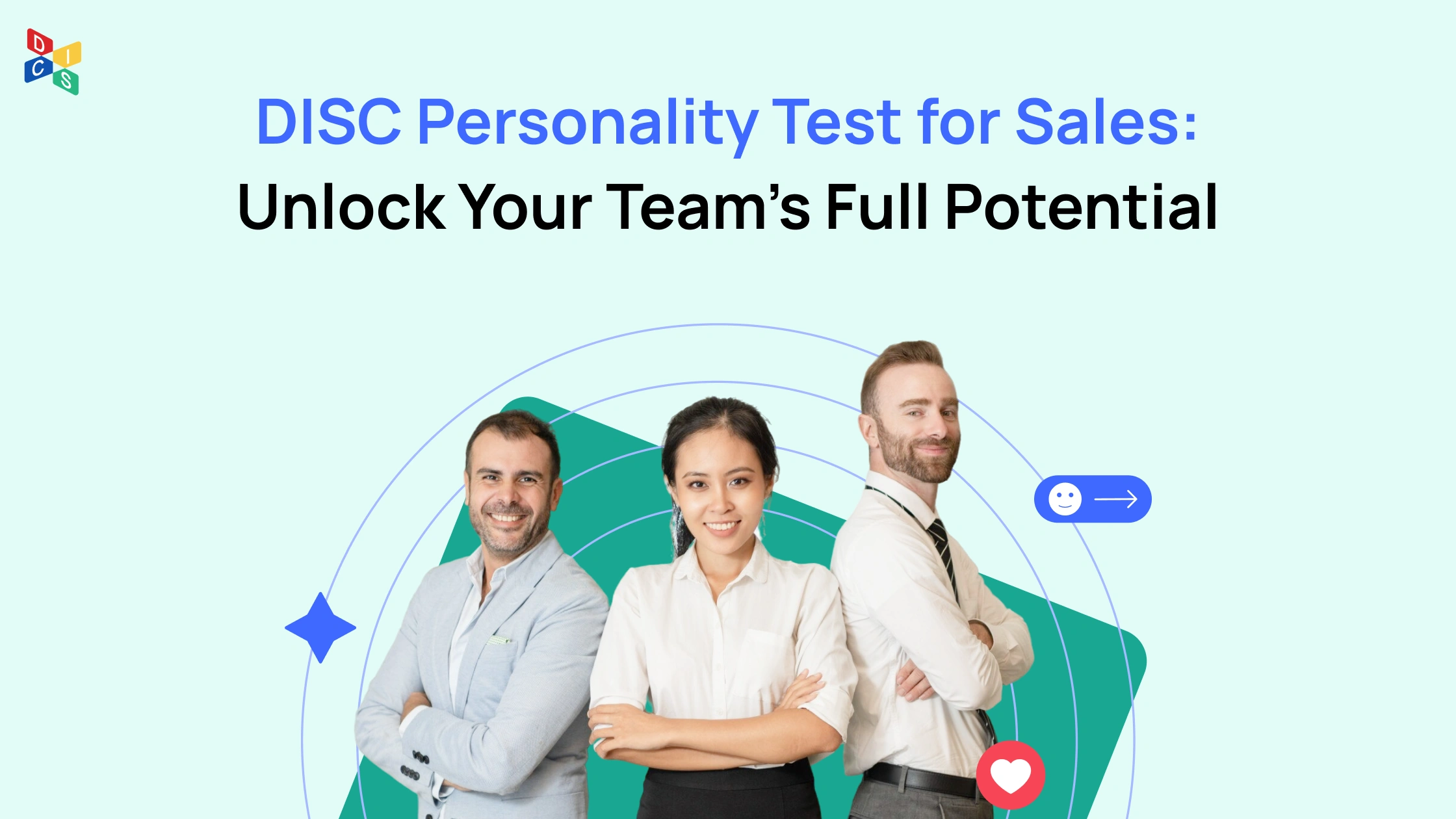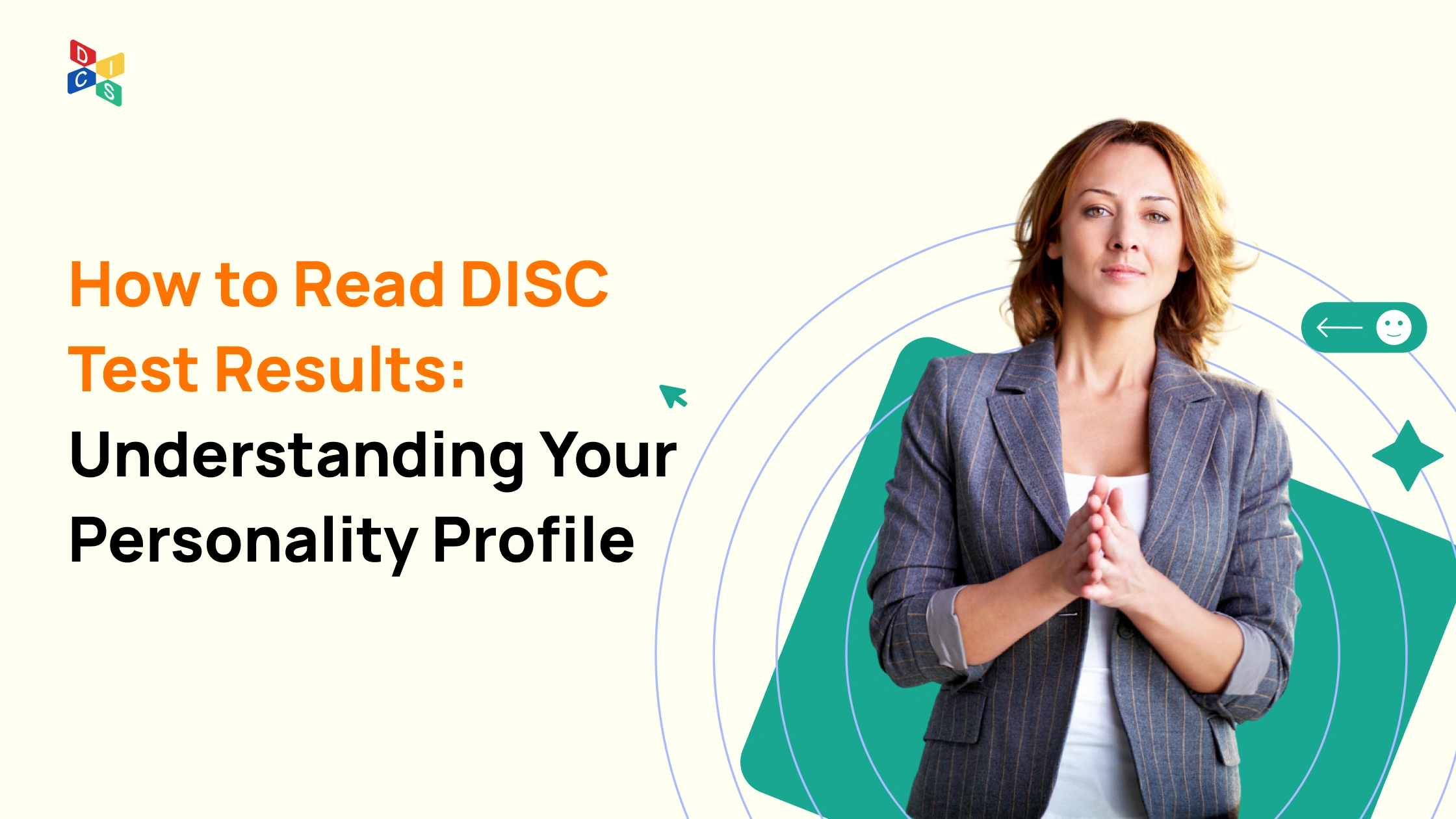Table of content
IS Personality Type In DISC: Traits, Strengths & How To Work With Them
The IS personality type is warm and supportive. Learn their traits, strengths, challenges, and how to connect & work better with this thoughtful style
Table of content
Ever worked with someone always ready to lend a hand, keeps the mood positive, and truly listens? Chances are, they have an IS personality type. Known for their warmth and steady support, IS types bring a thoughtful, people-first approach to everything they do. In this article, we’ll explore the S types’ core traits, strengths, and how you can collaborate and work more effectively with this compassionate personality style.
What Does An IS Personality In The Disc Test Mean?
The IS personality type in the DiSC model combines the Influence (I) and Steadiness (S) styles. People with this personality type are often known for their warmth and sympathy, always understanding and supporting others. They tend to focus on the bright side of things and generally believe in the good in those around them.
IS individuals are typically cooperative, outgoing, and approachable, which helps them communicate effectively in their work and personal lives.

Read more about the DISC I personality and how this type influences communication and teamwork!
Core Characteristics Of The IS Personality Type
What shapes the characteristics of someone with the IS personality type are often underlying assumptions: deep-rooted beliefs that quietly steer our behaviors and decisions. Though these emotional drivers may not always be visible, they influence decision-making and shape long-term behavioral tendencies.
For people with a DiSC IS profile, emotional safety, social acceptance, and the wish to contribute to others' happiness are their important and core needs. IS types' actions frequently reflect a desire to avoid conflict and to maintain strong personal connections.

People with a DiSC IS style may align with these needs in various characteristics. Here are a few characteristics that show up in their day-to-day:
1. General Traits:
People with the IS personality type often present themselves as approachable, cheerful, and kind-hearted. Their demeanor is typically associated with extroverted behavior, making them easy to engage with in both personal and professional settings.
These individuals bring positive energy to interactions and often prefer working in group settings. Common characteristics of the IS personality include:
- Warm
- Emotionally expressive
- Team-oriented
- Hopeful
2. Motivation:
Those with the DiSC test IS personality are naturally drawn to teamwork and collective success. With a strong focus on relationships, they often feel energized when the group is united and working toward a shared purpose. Their motivation is rooted in a deep desire to support others and build a sense of togetherness.
Typical motivators for individuals with the IS type include:
- Doing what benefits the team as a whole
- A sense of belonging
- Lifting others up
3. Priorities:
According to the DISC Model framework, the key priorities for the IS personality type are enthusiasm, working together, and being a steady source of encouragement. These individuals are naturally drawn to environments where they can contribute to a sense of ease and togetherness. These individuals place high importance on/ tend to prioritize:
- offering reassurance to others
- making sure everyone feels involved
- bringing energy and positivity to the team

4. Workplace Stressors:
To build stronger relationships with colleagues who exhibit the IS personality type, it’s helpful to recognize what situations tend to create tension for them. Being mindful of these specific pressure points allows leaders and team members to respond with empathy and patience. Individuals with the IS personality type DiSC may feel uneasy in scenarios that involve:
- Addressing performance issues
- Having to make tough calls on their own
- Voicing concerns or complaints
- Placing demands on others
Find Out: Best DISC I personality type careers for success
5. Fears:
Like every DiSC style, those with the IS personality carry certain deep-seated fears, even if they aren't always obvious. These concerns subtly shape how they interact, respond to pressure, and make decisions.
People who fall under the DiSC IS profile often worry about:
- Being rejected or not fitting in
- Dealing with interpersonal confrontation
Strengths And Weaknesses Of IS Personality In Disc
Understanding the unique qualities of the IS personality type can offer valuable insight into how individuals with this DiSC style interact with others, handle challenges, and contribute to team environments. Whether you're a manager looking to build better team dynamics or someone exploring your results from an IS personality type test, recognizing these traits can help you navigate both strengths and limitations more effectively.
Below are some of the most common strengths and potential weaknesses associated with the DiSC IS style:
DISC IS Personality Strengths
- Tends to see others’ potential through a positive lens.
- Balances work and personal conversations naturally, creating a relaxed tone.
- Keeps lines of communication open to ensure everyone stays informed.
- Approach challenges with empathy and emotional awareness.
- Builds an atmosphere of warmth and approachability with colleagues.
- Encourages team input when making plans or decisions.
- Take into account how decisions will affect others emotionally.
- Looks to others for support when facing difficult situations.
DISC IS Personality Weaknesses
- May find it hard to push back against confrontational people.
- Delays tough decisions to avoid hurting someone’s feelings.
- Can lose objectivity in close relationships.
- Often stays overly hopeful in situations that require realism.
- Avoids actions that could lead to rejection or disapproval.
- Feels uneasy in high-conflict or hostile conversations.
- Tends to soften critical feedback, making it less clear.
- Prefers fixing mistakes quietly over addressing them directly with others.

Ways To Work Effectively With IS Personality People
The IS group brings a valuable mix of positivity and encouragement to group interactions. With their approachable and cheerful manner, they often uplift the mood during collaborations and discussions. These individuals prioritize harmony and are genuinely attentive to the emotions and perspectives of those around them.
IS groups’ adaptability allows them to support various working styles, making thm integral in fostering strong interpersonal connections. While tips for effective interaction can depend on your own DiSC profile, certain universal approaches can enhance your connection with someone of the IS personality type.
1. How To Communicate With The IS Personality
Each DiSC type has its own communication preferences, and understanding these differences can go a long way in improving workplace relationships. When engaging with someone who has the IS personality, adjusting your approach to match their style can make interactions more effective.
For those who naturally align with the IS type, these methods may come instinctively. For others, using thoughtful communication can lead to smoother, more meaningful conversations. Keep these tips in mind when communicating with an IS type:
- Show genuine interest in their thoughts and experiences.
- Steer clear of direct criticism or overly assertive tones.
- Promote teamwork and emphasize collaboration.
Explore More: Top 4 famous free personality tests
2. The IS Personality In Meetings
To run productive meetings with individuals who have the IS personality type, it helps to understand what drives them. They often value connection and clarity, so striking a balance between relationship-building and task focus is key. Some effective ways to support the IS type during meetings include:
- Openly encourage sharing ideas and success.
- Give them a moment to reflect on feedback before expecting a response.
- Take a moment to connect - even casual, non-work conversations can strengthen the relationship.

3. Problem-Solving With IS Personality Styles
When addressing challenges with someone of the DiSC IS personality, it’s important to foster a sense of emotional safety. These individuals thrive in environments where they feel heard and included. As you work together on solutions, it’s helpful to remind them that your partnership remains strong, even if you don’t always see eye to eye. To encourage effective problem-solving:
- Provide a welcoming space where they can express their thoughts.
- Acknowledge their input rather than brushing it aside.
- Approach disagreements gently, avoid intense or combative tones.
- Clarify timelines and when decisions need to be made, so expectations are clear.
4. DiSC IS Personality Type Careers
Individuals with the IS type often thrive in roles that prioritize human connection and emotional intelligence. They are naturally empathetic, collaborative, and motivated by opportunities to support and uplift others. Careers that involve regular interaction and allow them to build strong relationships tend to be the most fulfilling. If you’re exploring people-focused careers that align with the strengths of the IS personality type, consider these options:
- Guidance Counselor: Supports students in their personal and academic growth.
- Mediator: Helps resolve conflicts by fostering understanding between parties.
- Trainer: Leads learning sessions in a way that energizes and motivates others.
- Teacher: Creates inclusive, encouraging classrooms that support student success.
- Career Advisor: Guides individuals in making meaningful career choices.
- Financial Advisor: Builds trust while helping clients plan for their future.
Community Organizer: Connects and empowers communities through outreach.
Client Services Director: Ensures clients feel valued and supported at every stage.
Customer Support Representative: Solves problems while maintaining positive relationships. - Director of Partnerships: Cultivates and manages strong organizational alliances.
The Is Personality Type In Relationships
People with the DiSC test IS personality tend to bring warmth and openness into their romantic connections. They’re known for their sincere interest in their partner’s emotions and often go out of their way to create a safe, nurturing space within the relationship. With a natural gift for tuning into others’ feelings, IS types frequently demonstrate empathy and genuine curiosity about their partner’s inner world. Their inclination to adapt to evolving circumstances makes them reliable when navigating life’s changes together.

DISC IS strengths in relationship:
- Strong capacity for empathy in relationships
- Deep commitment to emotional connection
- Flexibility in adapting to evolving circumstances
DISC IS Romantic weaknesses in relationship:
- Tend to solve stress and irritation
- Give their partner too much privacy
- Solve problems with reason and logic a lot
Styles Compatible With The IS Personality Type: I And Si
The Everything DiSC circumplex identifies 12 distinct personality styles, with each type positioned about others to reflect their similarities and differences. Sitting on either side of the IS personality type are the i and SI styles, making them the most closely related in behavior and tendencies.

alt: I and SI types are similar to the IS personality type
I Style
Individuals with the i style often share overlapping characteristics with the iS personality, yet they tend to express themselves with even more spontaneity and enthusiasm. Their social energy is generally more outward-facing, and they may be quicker to engage in conversation or take initiative in group settings. Compared to iS types, they typically bring a heightened level of excitement and a desire to inspire those around them.
SI Style
In contrast, people with the Si style also exhibit traits that align closely with the IS personality, but their approach is notably more measured. Both styles score similarly on the IS/SI axis, reflecting a shared emphasis on harmony and collaboration. However, Si individuals are usually more deliberate, preferring to think things through and act with caution. Their calm demeanor often balances the more people-focused energy of the iS type.
Read more about the 16 DISC personality types and how they shape behavior in various environments!
Conclusion
Understanding the IS personality type gives you insight into one of the most empathetic and encouraging styles in the DiSC model. Whether you're leading a team or building personal connections, recognizing the unique strengths that IS types bring can create deeper trust and stronger collaboration. If this article helped you better understand the IS style, be sure to explore our other resources to get the full picture of all DiSC personality types!
FAQs
1. Do IS Personality Types Make Great Salespeople?
The IS personality type salespeople excel in building personal connections with customers. Their friendly attitude and positive energy create a comfortable atmosphere, making customers feel more at ease. With a sincere interest in understanding others, those with the DiSC test IS personality can forge meaningful relationships that resonate with clients.
2. What Would An IS Manager Be Like?
The DiSC IS personality leaders are supportive, optimistic, and team-oriented. They naturally foster an environment where trust and cooperation flourish. With a strong focus on people, they often go the extra mile to ensure everyone feels included and valued.
3. What is the IS personality type quiz, and how does it help?
Câu trả lời: The IS personality type quiz is a tool designed to assess individuals' behavioral preferences based on the Myers-Briggs Type Indicator (MBTI). It focuses on the IS personality, which stands for Introverted, Sensing, and Feeling. This quiz helps people understand their natural tendencies, such as processing information, making decisions, and interacting with others. By taking the quiz, individuals can gain insight into their strengths, challenges, and preferred work styles, which can be valuable for personal growth, career development, and improving communication.
Explore more about the key differences between the two personality frameworks: DiSC and MBTI now!


Don't Let Your Potential Stay Hidden!
Take the DISC test today and discover your unique 'YOU', with deep insights into your true personality and potential.

Represents your instinctive behaviors and desires.
Shows the behavioral tendencies you think you should exhibit in specific situations.
Related articles
You may also be interested in
 DISCJan 06, 2026
DISCJan 06, 2026DISC Personality Test for Sales: Unlock Your Team’s Full Potential
DISC Personality Test for Sales helps sales teams improve role fit and performance. Learn how DISC boosts hiring, coaching, and customer alignment.
 DISCJan 06, 2026
DISCJan 06, 2026How to Read DISC Test Results: Understanding Your Personality Profile
Learn how to read DISC test results and understand your personality profile. Discover how DISC can enhance communication, teamwork, and career growth.
 DISCDec 31, 2025
DISCDec 31, 2025What Is Group Culture? How Team Behaviors Shape Workplace Success
Discover what is group culture and how it shapes team dynamics, decision-making, and performance. Learn how the DISC model can help improve your team’s culture.
